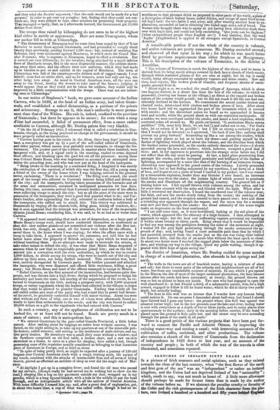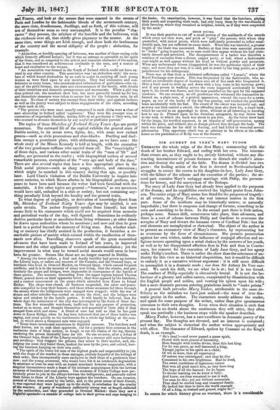SKETCHES OE IRELAND SIXTY YEARS AGO
Is a picture of Irish manners and social opinions, such as they existed towards the close of the last century, when "the first flower of the earth and first gem of the sea" was an "independent" or rather an isolated kingdom, and the Union had not deprived Ireland of her "nationality"; which, Booth to say, was not much to boast of. A little more allowance should perhaps be made for former times than is made by the author of the volume before us. If we abstract the peculiar cruelty or ferocity of the Celtic and the rich grotesqueness of the Irish character from the plc. tare, rate Ireland a hundred or a hundred and fifty years behind England and France, and look at the scenes that were enacted in the streets of Paris and London by the fashionable bloods of the seventeenth century, the mere riots, drunkenness, duellings, and so forth, of this volume, will not of themselves seem so very unexampled. It is the peculiar " cha- racter " they possess, the mixture of the horrible and the ludicrous, with the richness over all, that chiefly gives piquancy to the matter. At the same time, some things are Irish enough, and show both the lawlessness of the country and the moral obliquity of the people : abduction, for example.
"Abduction, or forcibly carrying off heiresses, was another of those crying evils which formerly afflicted Ireland; but it was an outrage so agreeable to the spirit of the times, and so congenial to the ardent and romantic character of the natives, that it was considered an achievement creditable to the man and a matter of boast and exultation to the woman. '
"An association was formed in the South of Ireland which could not have ex- isted in any other country. This association was an abduction club,' the mem- bers of which bound themselves by an oath to assist in carrying off such young women as were fixed upon by any members. They had emissaries and con- federates in every house, who communicated information of particulars—the ex- tent of the girl's fortune, the state and circumstances of the family, with details of their intentions and domestic arrangements and movements. When a girl was thus pointed out, the members drew lots, but more generally tossed up for her,
• immediate mmediate measures were taken to secure her for the fortunate man by all
the rest. No class of society was exempt from their visits; and opulent farmers as well as the gentry were subject to these engagements of the clubs, according to their rank in life.
"The persons who were most usually concerned in such clubs were a class of men abounding in Ireland called 'squireens.' They were the younger sons or connexions of respectable families, having little or no patrimony or their own, but who scorned to demean themselves by any useful or profitable pursuit."
The topics of these Sketches of Ireland Sixty Years Ago are pretty numerous. The outward life of the capital exhibits the general state of
Dublin society, in its street rows, fights, &c., with some now extinct genera—such as civic processions and shoe-blacks. Duelling and duel- lists occupy a prominent place, with abductions, as we have seen : the whole story of the Misses Kennedy is told at length, with the execution of the two gentlemen ruffians who carried them off. The "conviviality" of those days, and various other social traits of the "men of '98" and earlier, are presented to the reader ; with biographical notices of several remarkable persons, exemplars of the "very age and body of the time." There are also several topics that have a less appropriate place in the Irish social picture—such as slang songs, robbers, and executions ; which might be matched in this country during that age, or possibly later. Lord Clare's visitation of the Dublin University to inquire into secret societies, to which Moore alludes in his biographical prefaces, ap- pears to have been used because the writer had been furnished with the materials. A few other topics are general—" humours," as our ancestors would have said, embodied in a club or society, but not containing any- thing peculiarly Irish beyond the locality and the general traits.
- To what degree of originality, or derivation of knowledge direct from life, Sketches of Ireland Sixty Years Ago may be entitled, is not
quite certain. The author frequently speaks from himself; but there seems little in his statements which could not be acquired from memoirs and periodical works of the day, well digested. Sometimes he evidently derives particular facts or anecdotes from living witnesses ; at other times
he draws upon authorities whom he mentions ; and now and then he goes back to a period beyond the memory of living man. But, whether read-
ing or memory has chiefly assisted in the production, it furnishes a re- markable picture of society which existed within the recollection of thou- Sands now alive. Travelling observers speak of the great economical advances that have been made in Ireland of late years, in improved houses and the other appliances of comfort and accommodation ; yet the improvement in what may be termed social morals would seem to have been far greater. Scenes like these are no longer enacted in Dublin.
"Among the lower orders, a fend and deadly hostility had grown up between the Liberty boys, or tailors and weavers of the Coombe, and the Ormond boys, or
butchers who lived in Ormond Market, on Ormond Quay, which caused frequent conflicts; and it is in the memory of many now living, that the streets, and par- ticularly the quays and bridges, were impassable in consequence of the battles of these parties. lhe weavers, descending from the upper regions beyond Thomas Street, poured down on their opponents below; they were opposed by the butchers; and a contest commenced on the quays which extended from Essex to Island Bridge. The shops were closed, all business suspended, the sober and peace- able compelled to keep their houses; and those whose occasions led them through the streets where the belligerents were engaged were stopped; while the war of
Stones and other missiles was carried on across the river, and the bridges were taken and retaken by the hostile parties. It will hardly be believed, that for whole days the intercourse of the city was interrupted by the feuds of these fac- tions. The few miserable watchmen, inefficient for any purpose of protection, looked on in terror, and thought themselves well acquitted of their duty if they escaped from stick and stone. A friend of ours has told us that he has gone down to Essex Bridge, when be has been informed that one of those battles was raging, and stood quietly on the battlements for a whole day looking at the com- bat, in which above a thousand men were engaged. "These feuds terminated sometimes in frightful excesses. The butchers used their knives, not to stab their opponents, but for a purpose then common in the barbarous state of Irish society, to hough or cut the tendon of the leg, thereby rendering the person incurably lame for life. On one occasion, after a defeat of the Ormond boys, those of the Liberty retaliated in a manner still more barbarous and revolting: they dragged the persons they seized to their market, and, dis- lodging the meat they found there, hooked the men by the jaws, and retired, leav- ing the butchers hanging on their own stalls. " The spirit of the times led men of the highest grade and respectability to join with the dregs of the market in these outrages, entirely forgetful of the feelings of their order, then immeasurably snore exclusive in their ideas of a gentlemen than now; and the young aristocrat, who would have felt it an intolerable degradation to associate or even be seen with an honest merchant however respectable, with a singular inconsistency made a boast of his intimate acquaintance with the lawless excesses of butchers and coal-porters. The students of Trinity College were par- ticularly prone to join in the affrays between the belligerents, and generally united their forces to those of the Liberty boys against the butchers. On one occasion, several of them were seized by the latter, and, to the great terror of their friends, it was reported they were hanged up in the stalls, in retaliation for the cruelty of the weavers. A party of watchmen sufficiently strong was at length collected by the authorities, and they proceeded to Ormond Market: there they saw a frightful spectacle—a number of college lads in their gowns and caps hanging to the hooks. On examination, however, it was found that the butchers, pitying their youth and respecting their rank, had only hung them by the waistbands Of their breeches, where they remained as helpless, indeed, as if they were suspended by the neck."
IRISH BUCKS.
It was their practice to cut off a small portion of the scabbards of the swords which every one then wore, and prick or "pink' the persons with whom they quarrelled, with naked points, which were sufficiently protruded to inflict cons,- derable pain, but not sufficient to cause death. When this was intended, a greater length of the blade was uncovered. Barbers at that time were essential persons to bucks" going to parties, as no man could then appear without his hair elabo- rately dressed and powdered. The disappointment of a barber was therefore a sentence of exclusion from a dinner, supper party, or ball, where a fashionable man might as well appear without his head as without powder and pomattun. When any unfortunate friseur disappointed, he was the particular object of their rage; and more than one was, it is said, put to death by the long points, as a just punishment for his delinquency. There was at that time a celebrated coffeehouse called "Lucas's," where the Royal Exchange now stands. This was frequented by the fashionable, who as- sumed an intolerable degree of insolence over all of less rank who frequented It. Herea buck used to strut up and down with a long train to his morning gown; and if any person in walking across the room happened accidentally to tread upon it, his sword was drawn, and the man punished on the spot for the supposed insolence. On one occasion, an old gentleman who witnessed the transaction in- formed us, a plain man, of a genteel appearance, crossed the room for a news- paper, as one of the bucks of the day was passing, and touched the prohibited tram accidentally with his foot. The sword of the owner was instantly out; and as every one then carried a sword, the offending man also drew his, a small tuck, which he carried as an appendage to dress, without at all intending or knowing how to use it. Pressed upon by his ferocious antagonist, he was driven back to the wall, to which the buck was about to pin him. As the latter drew back for the lunge, his terrified opponent, in an impulse of self-preservation, sprang within his point, and without aim or design pierced him through the body. The buck was notorious for his skill in fencing, and bad killed or wounded several adversaries. This opportune check was as salutary in its effects at the coffee- house as the punishment of Kelly was at the theatre.



























 Previous page
Previous page